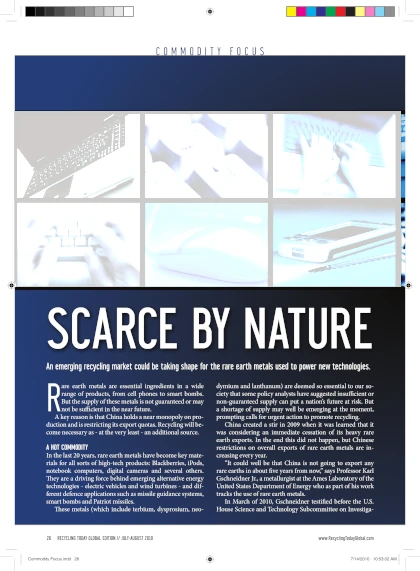Scarce by nature
An emerging recycling market could be taking shape for the rare earth metals used to power new technologies. Rare earth metals are essential ingredients in a wide range of products, from cell phones to smart bombs. But the supply of these metals is not guaranteed or may not be sufficient in the near future. A key reason is that China holds a near monopoly on production and is restricting its export quotas. Recycling will become necessary as – at the very least – an additional source.
In the last 20 years, rare earth metals have become key materials for all sorts of high-tech products: Blackberries, iPods, notebook computers, digital cameras and several others. They are a driving force behind emerging alternative energy technologies – electric vehicles and wind turbines – and different defence applications such as missile guidance systems, smart bombs and Patriot missiles.
These metals (which include terbium, dysprosium, neodymium and lanthanum) are deemed so essential to our society that some policy analysts have suggested insufficient or non-guaranteed supply can put a nation’s future at risk. But a shortage of supply may well be emerging at the moment, prompting calls for urgent action to promote recycling.

Export restrictions
China created a stir in 2009 when it was learned that it was considering an immediate cessation of its heavy rare earth exports. In the end this did not happen, but Chinese restrictions on overall exports of rare earth metals are increasing every year.
“It could well be that China is not going to export any rare earths in about five years from now,” says Professor Karl Gschneidner Jr., a metallurgist at the Ames Laboratory of the United States Department of Energy who as part of his work tracks the use of rare earth metals.
In March of 2010, Gschneidner testified before the U.S. House Science and Technology Subcommittee on Investigations and Oversight at a hearing on the threat of a rare earth supply shortage. On that occasion, he cautioned that “rare earth research in the U.S. on mineral extraction, rare earth separation, processing of the oxides into metallic alloys and other useful forms, substitution, and recycling is virtually zero.”
Increasing demand
“Every day, demand for rare earth metals is increasing, but supply isn’t,” observes Jack Lifton, co-founder and director of Technology Metals Research LLC, based in Illinois in the United States. Between 2003 and 2008, global demand for these metals increased from 85,000 tonnes to 124,000 tonnes per year.
In 2016, this figure will have jumped to 200,000 tonnes, according to Dudley Kingsnorth of the Industrial Metals Company of Australia. In his opinion, by around 2016, from the global perspective, demand could surpass supply.
At present, companies around the world are opening new mines or are bringing old mines back into use.
“This would stabilise supply of rare earths a bit, but the domination of China will not be gone,” says Stanley Trout, an independent consultant on rare earth metals based in Indiana in the United States. “In five or 10 years, I think the Chinese number will be down to 70 or 75 percent,” says Trout.
Refining technology
Currently, though, China is also the only country in the world capable of refining rare earth oxides into the different rare earth metals. “We are only beginning to wake up to the fact that we may have access to ores, but not to the refining technology,” says Stuart Burns, who works from an office in Eastleigh, United Kingdom, for consulting firm Aptium Global Inc.
Chemical properties of rare earth elements are very much alike, which makes it difficult to separate them from each other, according to Lifton. “Once they are separated, you best keep them in that form and recycle them after use,” he comments.
“Also, if you mine an ore you get a lot of cerium, which is the least interesting of all the rare earths. In general, an ore contains much lower quantities of neodymium and even lower amounts of dysprosium. If you recycle these, you are sure of what you get.” (...)
Publication: Recycling Today
Date: July 2010
Would you like to read the entire article? If so, please let me know!
CONTACT MEA resource revolution? Don’t hold your breath | EU Policy
Read More

Return to steam power

Action’s needed, but talk is almost all there is
Interested in working together?
I'd love to hear from you.